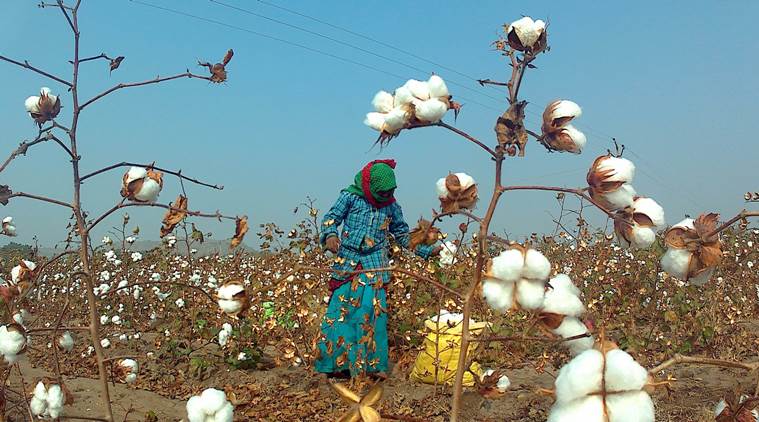On January 8, a two-judge Bench of the Supreme Court set aside an order of a Division Bench of the Delhi High Court last year, which had invalidated US-based Monsanto Technology’s patent on technology used in Bt Cotton seeds. It concerns two Bt Cotton seed varieties, Bollgard and Bollgard II, genetically modified to resist the bollworm pest.

The case relates to a dispute between Monsanto and Nuziveedu Seeds Ltd over the technology. Under a 10-year sub-licence agreement between the two companies in 2004, Nuziveedu could develop “Genetically Modified Hybrid Cotton Planting Seeds” with the help of Monsanto technology and commercially exploit it. In return, Nuziveedu had to pay “licence fee/trait value”. Monsanto terminated the agreement in 2015, with disputes having arisen over these payments amid a price control regime introduced by the government.
Monsanto filed a civil suit in Delhi High Court, claiming that Nuziveedu Seeds was infringing on its patent by using its technology. It also filed an application for injunction to restrain Nuziveedu from using the Monsanto trademark during the pendency of the civil suit. Nuziveedu filed a counter-claim against Monsanto’s patent claim.
Is the Supreme Court ruling a victory for Monsanto?
Story continues below this ad
The legal battle is far from over. The Supreme Court has only ruled on Monsanto’s injunction plea. Before the Supreme Court heard the matter, Delhi High had passed two separate orders. First, a single judge passed an interim injunction, ruling that during the pendency of the case, both parties would have to abide by obligations under their agreement, and that Nuziveedu Seeds should pay licence fees in accordance with the regulatory requirement. In the second order, the Division Bench not only set aside the single-judge order but also ruled that Monsanto’s patent claim was invalidated under Section 3(j) of the Patents Act.
So, what does the SC judgment mean?
The Supreme Court Bench of Justices Rohinton Fali Nariman and Navin Sinha observed the HC Division Bench “ought to have confined itself to examination of the validity of the order of injunction granted by the learned single judge only”, and that it “ought not to have examined the counter-claim itself usurping the jurisdiction of the Single Judge to decide unpatentability… in the summary manner done”. The judgment reads: “Summary adjudication of a technically complex suit requiring expert evidence also, at the stage of injunction in the manner done, was certainly neither desirable or permissible in the law. The suit involved complicated mixed questions of law and facts with regard to patentability and exclusion of patent which could be examined in the suit on basis of evidence.” The SC ruling restores the single-judge order, with the suit remanded back for disposal “in accordance with law”. This means that the single judge will now hear the matter of patentability.
What has Monsanto’s argument been?
In the present suit, there are two sets of patent claims — 1-24 relating to processes, and 25-27 relating to the chemical product NAS (Nucleic Acid Sequence). Monsanto has claimed that NAS is a man-made DNA construct and not part of a plant existing in nature; the DNA construct is inserted into a plant “which confers the trait of insect tolerance”.
Again, one of the components of the DNA construct is a man-made gene. When it is inserted into the cell of the plant at a particular location, it results in the production of “a fusion protein”. Monsanto’s argument is that the production of the fusion protein is critical for the technology to be effected; that it is only its technology that allows a cotton plant to produce it; and that the product is “protected inter alia by claims 25-27 of the patented inventions”.
What has Nuvizeedu’s argument been?
Story continues below this ad
It has argued that its rights are protected under the Protection of Plant Varieties and Farmers’ Rights Act, 2001. It has argued that the patent suit was bad because “claims 1-24 were ‘process claims’ concerning genetic engineering or biotechnology method to insert NAS into a plant cell as in claim 25-27 practiced in laboratory conditions, unlike the complete biological process adopted by the defendants (Nuvizeedu)”.
Nuvizeedu has said it did not not violate patented rights on a number of grounds — it sowed seeds of its own proprietary cotton varieties alongside the Transgenic Bt Cotton seed; the Transgenic Bt Cotton seed and Nuziveedu’s varieties seed yielded different plants which were cross-pollinated at the flowering stage; the cotton fruits from Nuziveedu’s varieties had cotton seeds carrying the proprietary “Bt cotton hybrids”; Nuziveedu had obtained the approval of the Genetic Engineering Approval Committee under the Environment (Protection) Act, 1986 for the commercial release of each new Bt cotton hybrid.
What happens now?
The Supreme Court has not dealt with any of these issues; it will be the Delhi HC single judge who will do so. “Though very elaborate submissions have been made with regard to facts and the technical processes involved in the patent in question… in view of nature of the order proposed to be passed, we do not consider it necessary to deal with the same at this stage, and leave open all questions of facts and law to be urged for consideration in appropriate proceedings,” the SC said.

 Migrant worker picking cotton in the fields just outside Jodhpur. Express Photo Javed Raja
Migrant worker picking cotton in the fields just outside Jodhpur. Express Photo Javed Raja




































